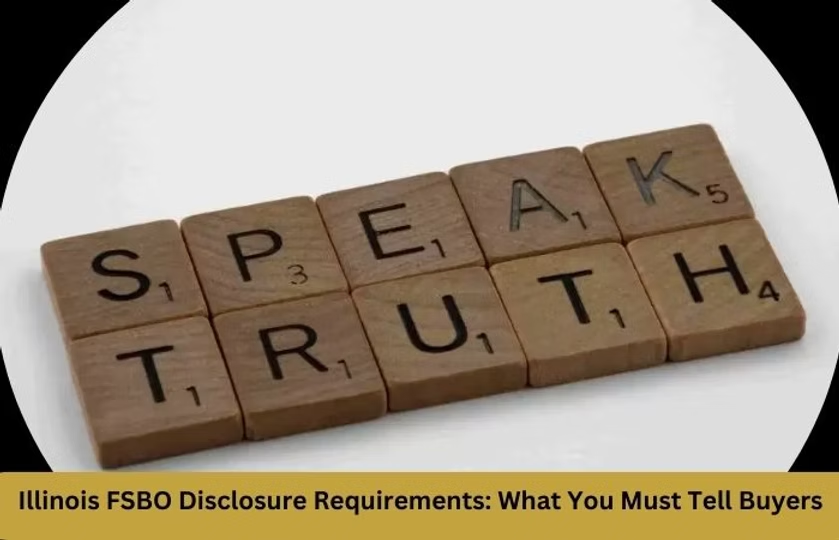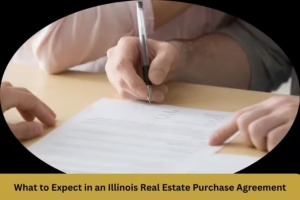When selling your home without a real estate agent-a process known as For Sale By Owner (FSBO)-you take on multiple responsibilities that would otherwise be handled by a licensed professional. One of the most important aspects of an FSBO sale in Illinois is complying with state disclosure requirements. Failing to do so can not only delay the sale but also expose you to serious legal consequences. At The Real Estate Law Firm, we help FSBO sellers navigate these legal obligations to protect both their interests and those of prospective buyers.
Get full support for your FSBO home sale here.
Why Are Disclosures Important?
Disclosure laws are designed to protect buyers by ensuring they are fully informed about a property’s physical condition and legal status before purchase. As an FSBO seller, you are legally obligated to disclose known defects and material facts that may influence the buyer’s decision. Transparency is not just ethical-it’s required by law in Illinois.
Key Illinois FSBO Disclosure Requirements.
In Illinois, FSBO sellers must complete and deliver several types of disclosures. Here’s a breakdown of the key ones:.
1. Illinois Residential Real Property Disclosure Report (Required).
This is the most critical disclosure for FSBO sellers. Required under the Illinois Residential Real Property Disclosure Act (765 ILCS 77/), this report asks sellers to answer “yes, ” “no, ” or “not applicable” to 23 questions about the condition of the property. Topics include:.
Basement water issues.
Roof defects.
Plumbing, electrical, or HVAC issues.
Environmental hazards (e. G., lead, asbestos, radon).
Boundary or encroachment disputes.
This form must be delivered before a purchase contract is signed, and buyers have 3 business days to cancel the contract if they receive the disclosure after signing.
Pro Tip from The Real Estate Law Firm: Be truthful and thorough. Misrepresentation or omission can lead to lawsuits and financial penalties-even after the sale.
2. Lead-Based Paint Disclosure (If Home Built Before 1978).
Federal law requires this disclosure for any residential property built before 1978. It includes:.
Disclosure of any known lead-based paint hazards.
Copies of any reports or tests conducted.
A government-approved pamphlet titled “Protect Your Family From Lead in Your Home”.
Buyers must also be given the opportunity to conduct a lead inspection if desired.
3. Radon Disclosure.
Although radon testing is not mandatory, Illinois law requires that you disclose any known radon hazard or provide the buyer with a copy of a radon test report if one has been performed. If your home has high radon levels, this must be disclosed in writing.
Need help preparing radon disclosures? Contact us.
4. Mold, Asbestos, and Other Environmental Hazards.
While Illinois law does not mandate a specific mold disclosure, any known environmental hazard-including mold, asbestos, or underground storage tanks-must be disclosed. Failure to do so can constitute fraud or misrepresentation.
5. Well and Septic System Disclosure (If Applicable).
If your property has a private well or septic system, you must disclose:.
Known issues with the system.
Any service or repairs made.
Whether the well water meets safety standards (if tested).
6. Homeowners Association (HOA) Disclosures.
If your property is part of an HOA, you must provide:.
HOA contact information.
Monthly dues.
Rules and regulations.
Financial health of the HOA.
Pending special assessments.
This disclosure gives buyers a clear understanding of the community’s governance and financial responsibilities.
7. Disclosure of Material Defects Found During Prior Inspections.
If a prior inspection (even if done for a previous buyer) revealed a material defect and you are aware of it, it must be disclosed, even if repaired-along with documentation of the repair.
How and When to Provide Disclosures.
Disclosures must be delivered before the buyer signs the purchase agreement. If disclosures are delivered after the contract is signed, the buyer has the right to:.
Cancel the contract within 3 business days.
Request repairs or credits.
Renegotiate the terms.
At The Real Estate Law Firm, we advise FSBO sellers to provide all disclosures in writing and early in the process to avoid complications and delays.
Meet our team for personalized FSBO guidance.
The Legal Risks of Non-Compliance.
Failing to disclose required information can lead to:.
Cancellation of the sale.
Lawsuits for misrepresentation or fraud.
Financial penalties and court costs.
Damage to your reputation.
Even if a buyer doesn’t discover the defect immediately, Illinois law allows them to file a lawsuit within one year of discovering the issue. That’s why full compliance is not optional-it’s a legal necessity.
Why Work With The Real Estate Law Firm?
While you may be selling your home on your own, you don’t have to navigate legal complexities alone. The Real Estate Law Firm specializes in helping FSBO sellers draft, review, and deliver legally sound disclosures. We ensure you’re protected from liability and help your sale proceed smoothly.
Final Thoughts.
Selling your home FSBO in Illinois can be rewarding, but only if done with diligence and legal care. By understanding and fulfilling your disclosure obligations, you build trust with buyers and protect yourself from costly legal issues. The Real Estate Law Firm is here to guide you through every step of the FSBO disclosure process so your sale is not just successful-but also compliant and secure.
FAQs:.
1. What is the Illinois Residential Real Property Disclosure Report?
It’s a mandatory document that outlines known material defects in the home, covering 23 specific questions about property condition.
2. Can I be sued if I fail to disclose a defect?
Yes. If the buyer later discovers that you knowingly withheld information, you could face legal action for misrepresentation or fraud.
3. When must I deliver the disclosure forms to the buyer?
Before the purchase agreement is signed. If not, the buyer gets 3 business days to cancel the contract upon receiving them.
4. Do I have to disclose issues I’ve already repaired?
Yes. If you’re aware of past defects, they must still be disclosed-even if fixed-especially if discovered through previous inspections.
5. Is a lead-based paint disclosure required for all homes?
Only for homes built before 1978. Federal law mandates this to protect buyers from potential health hazards.
6. What happens if I don’t have radon test results?
You are not required to test for radon, but if you know of existing high levels, you must disclose them.
7. Are mold and asbestos disclosures mandatory?
Yes, if you are aware of their presence. These are considered material defects and must be disclosed to the buyer.
8. What if my property is part of an HOA?
You must disclose HOA fees, rules, and any known issues such as pending special assessments or rule changes.
9. Can I use an attorney to prepare disclosures for me?
Absolutely. At The Real Estate Law Firm, we help FSBO sellers prepare and review all required disclosures to avoid legal risks.
10. Is verbal disclosure enough? No. All disclosures must be in writing and provided in compliance with Illinois law to be legally valid.




